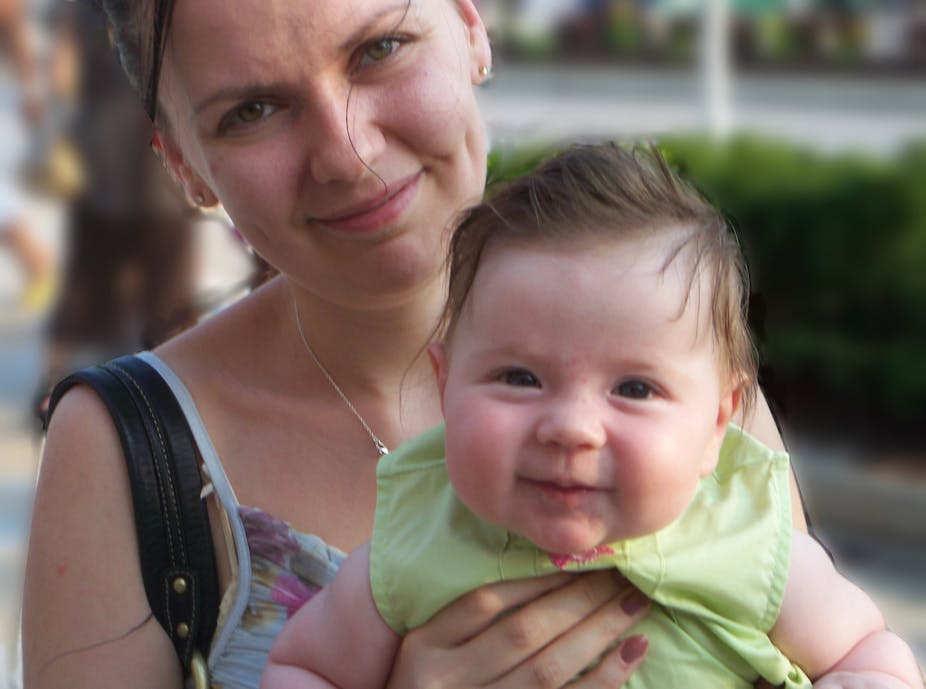It seems we have a new “barbecue stopper” about women and families, after comments last week by Perth obstetrician Barry Walters that it is selfish for older women to have babies.
Defending himself from attack in the heated national debate that followed, Walters sought to defuse the political impact of his comments, by claiming that he was talking about “medical facts”, and the risks of later pregnancy, not “values”.
Well, that’s another can of worms. Facts, after all, in their selection and presentation, can reveal as much as any overtly political comment.
In this case, missing from the “selfish older mothers” comments were myriad social facts that influence how women and men make decisions around pregnancy.
Just the facts?
So let’s turn to some of these other facts that cast a different light on the same issue.
First, there’s “choice” and “constrained choice”.
Choice in its idealised form means that everyone starts from the same position, and that each makes a simple selection between two or more options: a baby at 29 or at 39?
Yet choice, as philosopher Renata Salecl has recently pointed out, is not always as free as we would like to think – it’s accompanied by its own baggage of anxiety about the “right” choice to create the best outcome.
Constrained choice is the recognition of the real-life factors that shape a person’s decision making.

For many women, having a child at a biologically ideal age requires a host of other external factors to be in place, from having a partner who’s also prepared to have children at the “right” time, to sufficient financial security and good health.
Second, judgments about non-ideal pregnancies – too soon, too late, too irresponsible, too risky – tend to focus only on women. Yet pregnancy is so clearly an experience that involves another human being, even if it’s a purely biological connection.
More than that, the decision to try to get pregnant is one that is made in a social context, not a vacuum.
And one element of that social context particularly deserves exploring. It is this: as a society, we have decided to delay childbirth. We decided that when we gave women fuller access to public life without changing social structures to accommodate pregnancy and child rearing.
A woman will still do her best to be what Joan Williams has termed the “ideal worker”: the one who works like an unencumbered man.
If there are no easy on and off ramps to public life, that is, if leaving work or study to raise a baby means struggling to come back and if there’s inadequate flexibility or a lack of quality part-time work on return, there will always be a public cost to the supposedly “private” decision to have a child.
If a baby means becoming – or staying – one of the drudges of the marketplace and if caring work means risking poverty, then there’s a significant incentive for a woman to delay childbirth until she has gained a certain degree of seniority or financial security.
These choices remain gendered, since the statistics clearly show a persistent divide in paid and unpaid work, with men doing twice as much paid and women doing twice as much unpaid.
Where are the men?
So the issue is as much about men’s – also constrained – choices to commit to full-time work without any allowance for child rearing as it is about women’s choices to care for children.

Men’s ties to paid work means they have less time with children, do less domestic work and reduce women’s participation in public life.
This makes decisions around pregnancy carry all kinds of consequences, some invisible, and some seen but rarely spoken of.
If the response sparked by some seemingly off-hand comments about older mothers is so intense, then maybe there are some broader social issues we should also be discussing – if we want more women to avoid the medical risks of later pregnancy, what kind of social changes might we need to support earlier childbirth and rearing?
Finally, a caveat: I had all three of my children in my mid- to late-thirties, which qualifies me as one of the older mothers in this debate.
Of course there’s a story behind that “choice”, a story that makes perfect sense to me in the context of my own life.
Individual women will always have their stories about babies: the ones they wanted and didn’t have; the ones they lost; the ones they never wanted; the ones they have.
These stories are often beautiful and laden with meaning: grief, joy, regret and pleasure. There’s so much at stake for women with pregnancy, with childbirth and with child rearing.
Medical risks are one component of this, but there’s much – so much – more at stake than just medical facts.
Do you think women are choosing to have babies at a later age out of selfishness? Leave your comments below

